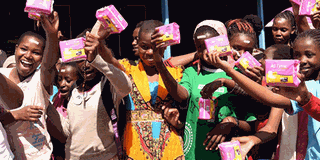Restore girls’ menstrual dignity

An investigative report aired by a local TV station some years back exposed the grim reality of girls using goat skin and leaves as sanitary towels.
In Marigat, Baringo County, school-going girls were undignified during their monthly periods adversely affecting their education.
The political leadership from the area denied that girls were facing such difficulties and instead accused the journalists of demeaning the region and its residents.
Often, women and girls have no access to sanitary towels, mostly because of unaffordability. This, therefore, leaves them with no choice but to use pieces of old blankets, clothes and leaves which are unhygienic and exposes them to urinary tract infections.
With no dignified way to manage their menses, girls fail to attend school leading to poor academic performance. This monthly absence from school, has contributed to millions of girls dropping out of school each year.
Last year, Baringo County Woman Representative Gladwel Tungo launched a sanitary towels programme aimed at keeping girls in school.
MISS SCHOOL
According to data from the Ministry of Education, girls miss four school days each month. This translates to two weeks of wasted learning each term. When you calculate these lost days in an academic year, a girl misses 39 days annually, just because of their periods.
In high school, a girl loses up to 156 learning days to her periods just because she cannot access or afford a sanitary towel.
Sadly, the statistics are likely to be grim when schools re-open following closure to manage the Covid-19 pandemic. This is because of the socio-economic imbalances that have pushed more women and girls into abject poverty.
The government has shown its commitment in keeping girls in school through its stand-alone policy which was approved in November last year.
The National Menstrual Hygiene Policy - the first of its kind in Kenya - aims at scaling up the management of menstrual hygiene especially for the vulnerable populations such as refugees, internally displaced persons, women and girls in informal settlements among others.
Secondly, it aims at tackling taboos and stigma associated to menstruation that have for decades affected the management of menstrual cycles.
The government came up with the policy after it emerged that menstruation hygiene management is not only a health concern, but a right.
GIRLS' HEALTH
Women and girls have a right to hygienic management of their period. It is, therefore, imperative for the government to fully embed it into the development agenda of the country if it is to stand counted among countries that care for their girls’ health.
It is mind-boggling that, 57 years after independence, our girls and women are so ravaged by poverty with 65 per cent unable to afford sanitary towels. The same percentage have no closed private spaces such as toilets to hygienically manage their menses.
More than 66 per cent of girls are not aware of periods until they get their first menses. This calls for sustained awareness and education on menstruation because of the taboos around this topic.
For those who can access sanitary towels, disposal remains a challenge. It is, therefore, not unusual to find used pads littering bushes, water bodies and sewage systems.
The formulation of this policy had been delayed since the Ministry of Health policy officials tasked with policy formulation, was made up of only male technocrats. How could something so important to women as menstruation be left to a men-only club? This could be the reason the policy took years to be formulated and approved and it should act as a lesson for other female-oriented policies.
As the world celebrates the Menstrual Hygiene Day, with this year’s theme being “It’s Time for Action”, Kenyans should be united to restore the dignity of girls during their menses.
Government agencies, the private sector and individuals should continue to promote awareness on the challenges girls face as we highlight solutions that can address challenges girls face so that they can realize their dreams.




